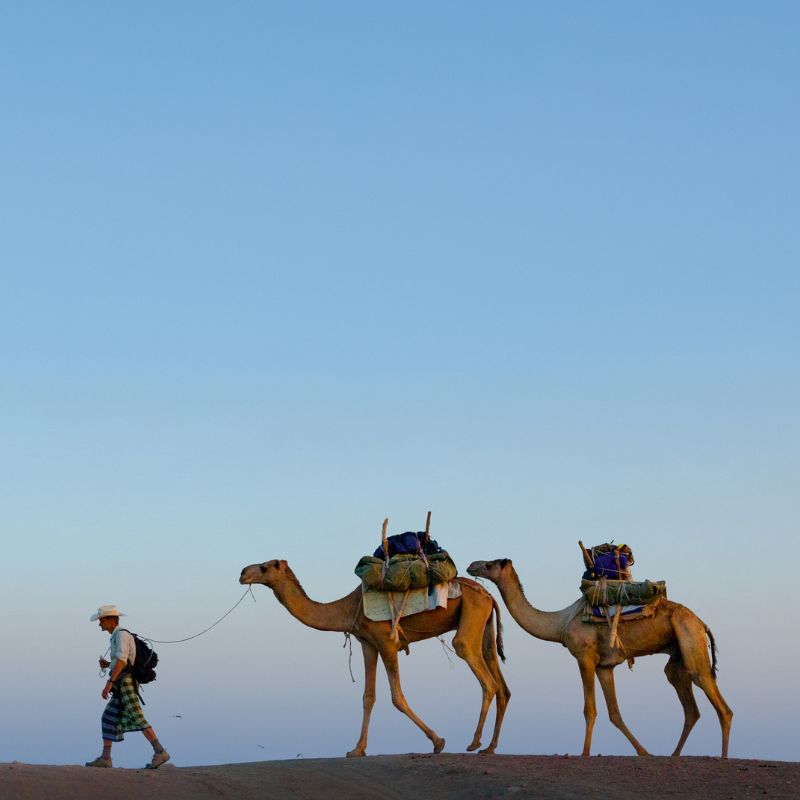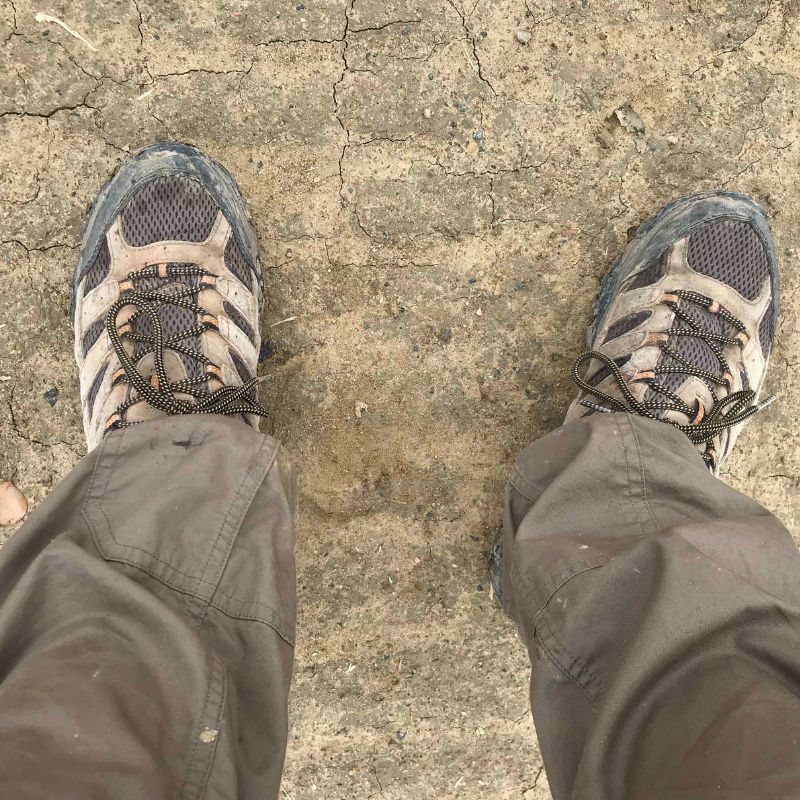I recently had the pleasure of interviewing Paul Salopek to discuss his incredible Out of Eden walk that has seen the National Geographic explorer follow in the footsteps of our human ancestors, in a monumental walk that started way back in 2013. Since the interview was so fascinating I decided to split it into three distinct parts. The first, touched on Paul’s memories from the past eleven years and his melancholy realization that the planet is completely messed up, while the second delved into Paul’s time crossing the villages of Northern India, and reminiscing about a country close to both of our hearts, Georgia. This, the third and final part in the series, discusses technological advances over the past decade and inspirational travel books. And while we know Paul loves to walk in Merrells, exactly what does he wear when they’re not available? Let's find out…
 |
| Paul in the Afar Desert, Ethiopia (Photo by John Stanmeyer, National Geographic) |
Lydia: When you started this walk in 2013, social media was pretty much in its infancy, and yet now, sometimes it feels as though it rules the order of the world. How has technology changed for you and how do you feel about its advancement? Paul: Yeah, so social media had been around for four, five, maybe six years when I started walking, but most platforms were in their early phases. I was carrying a very lightweight satellite phone because it was necessary out in the middle of the desert to communicate, send stories, or upload photos, but it was almost impossible to upload video because it was too expensive for me. I was also carrying a bricklike cinematic video camera and all this other crap, yet now, my entire project is an ultra-lightweight laptop and an iPhone. Those are the only tools I need for my multimedia work. But more important than that is the connectivity of the world now, right? The saturation of the inhabited landscape with towers, and microwave towers. So I did some research. When I started the walk in the Great Rift Valley of Ethiopia in 2013, the United Nations estimated that about 30 percent of the world's population was kind of wired together through the web. At this point, early smartphones were just becoming popularised. Now, I think it’s about 90 percent and so we are willingly, or unwillingly, guinea pigs for this unprecedented experiment to a collective unconscious, wired together like never before, and I don’t think anybody knows what the outcome is going to be. We’re still carrying stone-age brains and they haven’t caught up to what’s around you and me right now, they’re still kind of spinning.
Lydia: I completely agree. Social media—while it has so many positives—often feels like a toxic addiction, I much prefer reading when I’m traveling. Do you get the chance to read, and if so what can you recommend? Paul: Yeah, sure. I try to. I love physical books but I have to weigh everything that I carry so I use digital apps like Kindle on my laptop and so I have hundreds of books in my digital library and because I’m a journalist they’re often nonfiction journalistic books, history books, or political books. I did some historical research on travel writing in China and it’s interesting because the Chinese didn’t traditionally really have a genre called travel writing until very recently. They had something, that in the opinion of some might be better than travel writing, they had wandering poets.
 |
| A view of the Mekong River in Songpo, Yunnan, China (Photo by Paul Salopek, National Geographic) |
These amazing poets who lived anywhere from 700 to 1200 years ago wandered the landscape and were basically like knights-errant, a bit like unemployed dudes going from court to court trying to get a job and writing poems and often getting drunk on the way. So that kind of quote-on-quote travel literature if you will, is a very unexplored-to-westerners treasure trove of literature, and it’s hauntingly beautiful. These are people that were moving around Asia, usually at times of great upheaval, during, or after big civil wars, and so everybody is wandering around, drunk, and the result are these kind of canonical works of exile, of loneliness. There’s a lot of heartache and homesickness in this poetry of China.
I also try to read about a country before I arrive, but it’s a complicated thing, everybody works differently. Though it’s good to do your homework—you do as much research as you can, you call up experts, you interview whomever, historians, archaeologists—you also have to keep loose, you don’t want to be locked into your research because then you kind of cut off potentially new and serendipitous discoveries along the way, things that you’ll never find on the internet. It’s a balance between real-time discovery and having done some homework.
 |
| Paul's trust Merrells (Photo by Paul Salopek, National Geographic) |
Lydia: Totally. It would kind of defeat the object of this project if you didn’t go with the flow. Finally, something very lightweight, tell me about the shoes you walk in... Paul: If I can get them there’s an American brand called Merrell, that is not super expensive or hi-tech, they’re just kind of basic walking shoes, I try to use them because they last a long time. I can get 2,500km out of one pair. But often, of course, I can’t get them, so in China, I was buying cheap mountain boots in little village shops that would last literally two weeks before falling apart. I’ve worn rubber goloshes to go through snow. In India I wore sandals. Saudi Arabia, sandals. I just get whatever's available at the local souk!
You can follow more of Paul’s fascinating journey at Out of Eden Walk.
Post a Comment